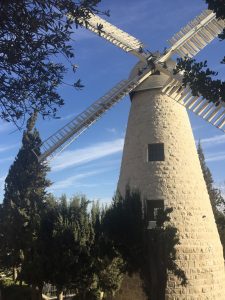 In a sermon she shared at the April 21 Shabbat Evening Service, Rabbi Elle Muhlbaum shares a loving tribute to Israel.
In a sermon she shared at the April 21 Shabbat Evening Service, Rabbi Elle Muhlbaum shares a loving tribute to Israel.
Hashkiveinu – This prayer is something we recite each evening, and there we ask to feel God’s protective presence over us, over Jerusalem, and over the world. As we approach Yom Ha’atzmeut, I’m thinking about my dad’s parents. Abraham and Yaffa, my saba and safta, who grew up in what has since become the state of Israel. My Saba Abie came to Israel as a baby from Germany, and Safta was thirteenth generation Palestinian. On one side of the family, my relatives fled the rising tides of antisemitism in Europe and sought safety in the Promised land. On the other side of the family, my relatives were so deeply rooted, it’s hard to imagine them anywhere else.
Both my saba and my safta fought in the war of Independence in 1948. They risked their lives for the establishment of the modern state of Israel. Thank God they survived the violence of that time. Eventually, just a few years after the war, they made their way to a different land of opportunity, a place where they hadn’t watched their friends and neighbors die, a place where they could make new memories with the family they would grow.
Their moving to America didn’t sever their ties to Israel, by any means. They continued to visit, and instilled in their children and their grandchildren the importance of our connection to Eretz Yisrael, the land of Israel.
I often think of my saba and safta, and I imagine how it felt to witness and participate in the atrocities of war as emerging adults. I think about the ripples of pain that affect that most special region of the world, generational cycles of pain. Loving Israel is a part of who I am, and it is exceedingly complicated. I care deeply about the lived reality of the modern state of Israel and its inhabitants and neighbors. I am invested in the success of the so-called start up nation. And, just as I look critically at the political realities of our own country, I wrestle with what the leadership of Israel have decided to do with the people within and around Israel’s borderlines.
I lived in Jerusalem during rabbinical school. It’s actually where Vlad and I met. I breathed the air, became light-headed at the holiness of it all. I nourished my body with the incomprehensible freshness of the bounty of the earth, nourished my mind with untangling the webs of Hebrew, and nourished my soul by exploring the slippery Jerusalem stone, imagining the millions of footprints that came before mine.
 I lived across the street from the Montefiore windmill in Yemin Moshe. The windmill was built by Montifiore’s team in the 1850s at his instruction as a philanthropic exercise; he wanted to help the Jews of Palestine to become self-sufficient. Ironically, the wheat of the land was too tough for the European-crafted mechanism, and the winds in Jerusalem were almost never strong enough to move the mill. Even so, this little windmill is an iconic part of the Yerushalmi landscape, and it’s captured the attention of artists since it was built. One such artist, my favorite cynical Israeli poet, Yehuda Amichai, wrote a poem inspired by this very windmill. He wrote,
I lived across the street from the Montefiore windmill in Yemin Moshe. The windmill was built by Montifiore’s team in the 1850s at his instruction as a philanthropic exercise; he wanted to help the Jews of Palestine to become self-sufficient. Ironically, the wheat of the land was too tough for the European-crafted mechanism, and the winds in Jerusalem were almost never strong enough to move the mill. Even so, this little windmill is an iconic part of the Yerushalmi landscape, and it’s captured the attention of artists since it was built. One such artist, my favorite cynical Israeli poet, Yehuda Amichai, wrote a poem inspired by this very windmill. He wrote,
This windmill never ground flour.
It ground holy air and Bialik’s
Birds of longing, it ground
Words and ground time, it ground
Rain and even shells
But it never ground flour.
Now it’s discovered us,
And grinds our lives day by day
Making out of us the flour of peace
Baking out of us the bread of peace
For the generation to come.
In Amichai’s imagination, the windmill is a witness to history. It ground rain and artillery shells, two things that both fall from the sky; one nurtures and one destroys, but the windmill has born witness to it all– both the beauty of nature and the violence of humanity. The windmill has ground words, so it’s observed the diversity of language, of accents, of dialects there. Though the windmill never really did what it intended to, it has still served a purpose. Unlike Bialik’s romanticism of Israel, Amichai gives us another perspective. In his view, we are part of what sustains the next generation. Our lives don’t sharpen us into weapons; instead, we are ground down into the flour of peace. A powerful purpose indeed; to become ingredients in the recipe of a peaceful future.
Tonight, as we prepare to join our voices together in hashkiveinu, we pray to feel the presence of God’s peace of us, over all Israel, and over the world. May the way the lives we lead help us create peace speedily and in our days.
Copyright © 2025 Anshe Chesed Fairmount Temple. All rights reserved. Website designed by Addicott Web and hosted by Dynamics Online.